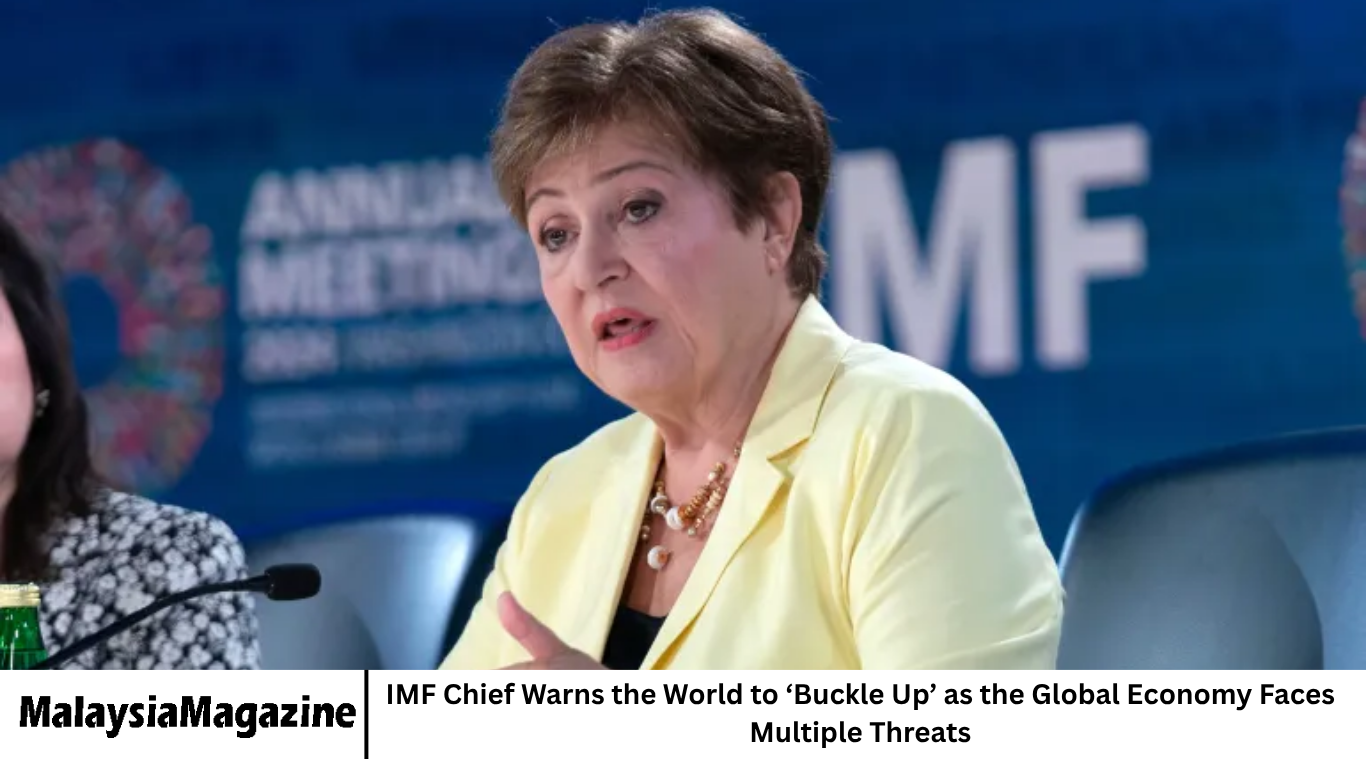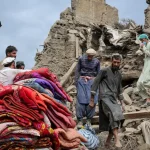The global economy is entering a period of deep uncertainty as multiple risks begin to converge. International Monetary Fund (IMF) Managing Director Kristalina Georgieva recently warned that the world must “buckle up” to face what she described as a challenging and volatile economic future. Her remarks highlight growing concerns about slowing global growth, persistent inflation, rising debt, and escalating geopolitical tensions.
The IMF’s warning comes at a critical time when governments, investors, and citizens are already feeling the effects of higher prices, weaker trade, and fragile financial markets. According to Georgieva, the next few years will test the world’s resilience and ability to adapt to an increasingly unpredictable environment.
This article explores the reasons behind the IMF’s warning, the challenges currently facing the global economy, and what actions might be needed to prevent a deeper downturn.
Global Growth Losing Momentum
The IMF has observed that global economic growth is slowing faster than expected. After recovering from the COVID-19 pandemic, most major economies now face weaker productivity, lower investment, and growing uncertainty.
Developed economies such as the United States and those in the European Union are struggling with high interest rates and tight monetary policies designed to control inflation. Meanwhile, developing countries are facing their own struggles, including debt burdens, weaker exports, and higher borrowing costs.
The IMF projects that global growth could remain below its historical average for several years if current trends continue. Georgieva’s message is clear: the world must prepare for slower growth and more economic turbulence.
Rising Inflation and High Interest Rates
One of the most pressing challenges is inflation. Despite aggressive actions by central banks, inflation remains stubbornly high in many parts of the world. Prices for food, housing, and energy continue to rise, eroding the purchasing power of ordinary people.
Central banks, including the U.S. Federal Reserve and the European Central Bank, have raised interest rates repeatedly to cool down inflation. While this has helped stabilize prices somewhat, it has also increased borrowing costs for consumers and businesses. Mortgage rates, business loans, and credit card debts have become more expensive, making it harder for families and companies to manage their finances.
The IMF warns that if inflation does not come down soon, central banks may have to keep interest rates high for longer, potentially leading to slower growth or even recession in some countries.
Mounting Global Debt
Another major concern is the rapid increase in global debt. Governments borrowed heavily during the pandemic to support their economies, but many are now struggling to manage those debts amid slower revenue and higher interest payments.
According to the IMF, global debt levels have reached near-record highs. Developing nations are particularly vulnerable because they often borrow in foreign currencies, making repayment harder when their local currencies weaken.
Rising debt burdens limit the ability of governments to invest in key areas such as healthcare, education, and infrastructure. In some cases, debt stress could lead to financial instability or defaults, further shaking confidence in the global economy.
Geopolitical Tensions and Trade Disruptions
Geopolitical tensions have added another layer of uncertainty to the global outlook. Conflicts in Eastern Europe, the Middle East, and other regions have disrupted trade routes, increased energy costs, and reduced investor confidence.
The growing rivalry between major powers, including the United States and China, has also reshaped global trade patterns. Restrictions on technology exports, sanctions, and new trade barriers are slowing cross-border investment and innovation.
For countries that rely heavily on exports or foreign investment, these disruptions could significantly weaken their economic prospects. The IMF has repeatedly called for diplomacy, dialogue, and cooperation to reduce the risks associated with geopolitical division.
The Climate and Energy Challenge
The IMF also highlights the growing economic impact of climate change. Extreme weather events are causing damage to infrastructure, reducing agricultural productivity, and increasing insurance costs.
At the same time, the transition to cleaner energy sources is creating both opportunities and challenges. While renewable energy investments are growing, fossil fuel dependency remains high in many regions. Energy price volatility, especially in Europe and Asia, continues to affect industries and households alike.
Georgieva has urged governments to invest in green technologies, energy efficiency, and sustainable development as part of their economic recovery strategies. She noted that ignoring climate risks would only increase the long-term costs of adaptation and disaster recovery.
Financial Market Volatility
Financial markets have become more volatile as investors react to changing interest rates, uncertain growth prospects, and political instability. Stock markets have experienced significant swings, and currencies in emerging economies have weakened against the U.S. dollar.
The IMF warns that rapid changes in financial markets can create instability, especially for countries with fragile banking systems or limited foreign reserves. Transparency, strong regulation, and effective monetary policy coordination are needed to maintain confidence and prevent panic.
Inequality and Social Pressure
Economic inequality remains another major issue that the IMF has highlighted. In many countries, the gap between rich and poor is widening. Inflation and slow wage growth are hitting lower-income families hardest, increasing social tension and political polarization.
The IMF believes that inclusive economic policies — those that support education, healthcare, and social safety nets — are essential to building resilience. Without them, rising inequality could threaten social stability and undermine public trust in institutions.
The Role of Emerging Economies
Emerging economies play a vital role in global growth, but they are facing particularly tough conditions. Many are dealing with currency depreciation, reduced foreign investment, and debt repayment pressures.
Countries in Africa, South Asia, and Latin America are also facing higher food and energy prices, which contribute to inflation and social unrest. The IMF is calling for international cooperation to provide debt relief and ensure fair access to financial resources.
Georgieva has emphasized that global problems require global solutions — and that cooperation between rich and poor nations is essential for economic stability.
Technology and the Changing Global Economy
Technological innovation continues to reshape the global economy, but it also brings new challenges. The rapid rise of artificial intelligence, digital currencies, and automation could disrupt job markets and increase inequality if not managed properly.
The IMF supports policies that encourage innovation while ensuring fair access to technology. Training and education programs will be crucial for helping workers adapt to the changing job landscape.
The IMF’s Recommendations
To navigate these uncertain times, the IMF has issued several key recommendations. These include:
-
Maintaining responsible fiscal policies to balance debt and investment needs.
-
Continuing efforts to control inflation through coordinated monetary policy.
-
Promoting international cooperation to reduce geopolitical and trade tensions.
-
Investing in sustainable energy and climate adaptation.
-
Supporting vulnerable economies through debt relief and financial aid.
Georgieva stressed that countries must remain flexible, pragmatic, and united in their approach to these shared challenges.
The Global Economy’s Path Ahead
The road ahead will not be easy. While some economies have shown resilience, others remain fragile. The IMF expects global growth to remain moderate in the near term, with risks tilted toward the downside.
Whether the world can navigate this turbulent period successfully will depend on how well governments, businesses, and international institutions work together. Cooperation and preparedness are the key messages behind the IMF chief’s warning to “buckle up.”
Frequently Asked Questions
Why did the IMF chief say “buckle up”?
The IMF chief used the phrase to warn that the global economy is entering a difficult period with multiple risks, including inflation, debt, and geopolitical conflict.
What are the main threats to the global economy?
The main threats include high inflation, slowing growth, rising debt, geopolitical tensions, and the impacts of climate change.
How is inflation affecting global growth?
High inflation is reducing consumer purchasing power and forcing central banks to raise interest rates, which slows down economic activity.
Why is global debt a major concern?
Global debt has reached historic highs, making it harder for governments, especially in developing nations, to manage finances and invest in essential services.
What role do emerging economies play in recovery?
Emerging economies contribute significantly to global growth, but they face severe challenges such as currency weakness, debt, and limited access to financing.
How does the IMF suggest countries respond to these challenges?
The IMF recommends strong fiscal management, cooperation between nations, climate investments, and measures to support vulnerable populations.
What impact do geopolitical tensions have on the economy?
Conflicts and trade disputes disrupt global supply chains, raise energy prices, and reduce investor confidence, slowing down overall growth.
What is the IMF’s outlook for the future?
The IMF expects global growth to remain modest and warns that without coordinated action, economic instability could worsen in the coming years.
Conclusion
The IMF’s call to “buckle up” serves as a stark reminder that the global economy faces one of its most complex and dangerous periods in decades. From inflation and debt to conflict and climate change, the challenges are numerous and interconnected.
Yet, as the IMF emphasizes, these threats can also become opportunities for reform, innovation, and cooperation. With careful management and shared responsibility, the world can still achieve stability and growth. But failure to act decisively could deepen global inequality and economic fragility.
















